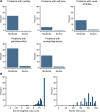Health-related quality of life 1-3 years post-myocardial infarction: its impact on prognosis
- PMID: 33563776
- PMCID: PMC7962722
- DOI: 10.1136/openhrt-2020-001499
Health-related quality of life 1-3 years post-myocardial infarction: its impact on prognosis
Abstract
Objective: To assess associations of health-related quality of life (HRQoL) with patient profile, resource use, cardiovascular (CV) events and mortality in stable patients post-myocardial infarction (MI).
Methods: The global, prospective, observational TIGRIS Study enrolled 9126 patients 1-3 years post-MI. HRQoL was assessed at enrolment and 6-month intervals using the patient-reported EuroQol-5 dimension (EQ-5D) questionnaire, with scores anchored at 0 (worst possible) and 1 (perfect health). Resource use, CV events and mortality were recorded during 2-years' follow-up. Regression models estimated the associations of index score at enrolment with patient characteristics, resource use, CV events and mortality over 2-years' follow-up.
Results: Among 8978 patients who completed the EQ-5D questionnaire, 52% reported 'some' or 'severe' problems on one or more health dimensions. Factors associated with a lower index score were: female sex, older age, obesity, smoking, higher heart rate, less formal education, presence of comorbidity (eg, angina, stroke), emergency room visit in the previous 6 months and non-ST-elevation MI as the index event. Compared with an index score of 1 at enrolment, a lower index score was associated with higher risk of all-cause death, with an adjusted rate ratio of 3.09 (95% CI 2.20 to 4.31), and of a CV event, with a rate ratio of 2.31 (95% CI 1.76 to 3.03). Patients with lower index score at enrolment had almost two times as many hospitalisations over 2-years' follow-up.
Conclusions: Clinicians managing patients post-acute coronary syndrome should recognise that a poorer HRQoL is clearly linked to risk of hospitalisations, major CV events and death.
Trial registration number: ClinicalTrials.gov Registry (NCT01866904) (https://clinicaltrials.gov).
Keywords: coronary artery disease; myocardial infarction; quality of healthcare.
© Author(s) (or their employer(s)) 2021. Re-use permitted under CC BY-NC. No commercial re-use. See rights and permissions. Published by BMJ.
Conflict of interest statement
Competing interests: SP has received research grant support from AstraZeneca. DBB has received speaker/consulting honoraria and/or research grant support from Amgen, AstraZeneca, Bayer, Boehringer Ingelheim, BMS, Eli Lilly, Merck and Sanofi. RO has received research grant support from AstraZeneca. JC has received research grant support from AstraZeneca and consulting honoraria from MicroPort, APT Medical and JW Medical. MGC has received speaker/consulting honoraria and/or research grant support from AstraZeneca, Medtronic, Abiomed and Merit Medical. SG has received speaker/consulting honoraria and/or research grant support from Amgen, AstraZeneca, Bayer, Boehringer Ingelheim, BMS, CSL Behring, Daiichi Sankyo/American Regent, Eli Lilly, Ferring Pharmaceuticals, GlaxoSmithKline, HLS Therapeutics, Janssen/Johnson & Johnson, Merck, Novartis, Novo Nordisk, Pfizer, Regeneron, Sanofi, Servier and Tenax Pharmaceuticals. CBG has received consulting honoraria and/or research grant support from Armetheon, AstraZeneca, Bayer, Boehringer Ingelheim, BMS, Daiichi Sankyo, Eli Lilly, Gilead, GlaxoSmithKline, Hoffmann-La Roche, Janssen, Metronic, Pfizer, Salix Pharmaceuticals, Sanofi, Takeda and The Medicines Company. JCN has received speaker/consulting honoraria and/or research grant support from Amgen, AstraZeneca, Bayer, BMS, Boehringer Ingelheim, GSK, Merck, Novartis, Pfizer and Sanofi. TS has received speaker/consulting honoraria and/or research grant support from Astellas, Amgen, AstraZeneca, Bayer, Boehringer Ingelheim, Eli Lilly, GlaxoSmithKline, Merck, Novartis, Pfizer and Sanofi. DW has received speaker/consulting honoraria and/or research grant support from AstraZeneca, Bayer, Berlin-Chemie, Biotronik and Novartis. SY has received speaker/consulting honoraria and/or research grant support from Takeda, Daiichi Sankyo, AstraZeneca, Boehringer Ingelheim and BMS. KH, CM and KAS are employees of AstraZeneca.
Figures



References
-
- National Institute for Health and Care Excellence (NICE) . Ticagrelor for preventing atherothrombotic events after myocardial infarction. NICE technology appraisal guidance 420. London: NICE, 2016. Available: https://www.nice.org.uk/guidance/ta420 [Accessed 20 Jul 2020].
Publication types
MeSH terms
Associated data
LinkOut - more resources
Full Text Sources
Other Literature Sources
Medical
